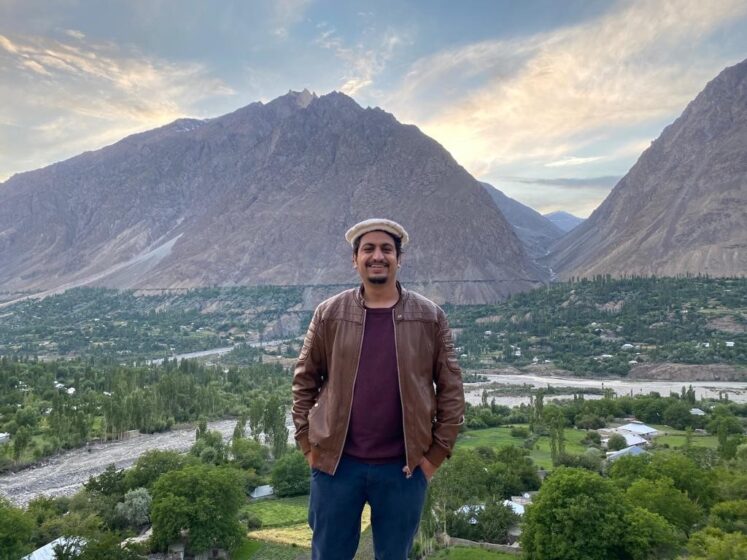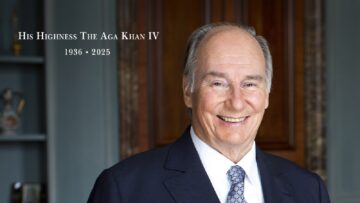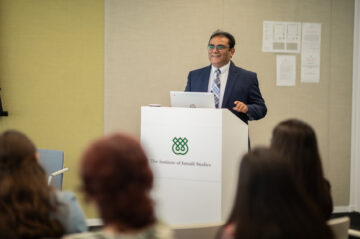Abdul Wahid Khan is one of our 2021 doctoral scholarship recipients and is currently working towards his DPhil at the University of Oxford on the impact of climate change in his hometown of Chitral in Pakistan. For Earth Day 2022, on April 22, he highlights some of the findings of the latest IPCC report on climate change and how they relate to the lived realities of people in Chitral, as well as his work with the IIS Climate Change and Sustainability Working Group.
When we talk about climate change, a lot of people think in terms of a future when the climate crisis will affect us, and this is also the supposition of the international conferences, like the UN Climate Change Conference (COP26), that take place in the West. Climate change holds a different meaning for people like me who come from fragile mountain communities. Every summer we stay up every night that it rains, watching out for floods that can destroy our houses at any time. The fear of flooding, particularly glacial lake outburst floods, has increased over time as there are more unexpected rains, and summer temperatures are increasing every year. We see floods washing away our lands, crops, trees, and houses in Chitral, while we stand there helpless. As a DPhil student of Geography and the Environment, I am grateful to the IIS for sponsoring me to research problems such as climate change that are the harsh realities of our time. In this blog, I want to highlight some of the findings of the Intergovernmental Panel on Climate Change (IPCC) that were published in their latest report on February 28th 2022 regarding climate impacts, adaptation, and vulnerability, and how they relate to the lives of people in Chitral.
The IPCC is one of the leading international bodies that provides legitimate information on climate change after rigorous research. Their new report reflects the work of 268 authors from 65 countries, spanning eight years of research on climate change mitigation. Despite its importance, the report contains hardly any new findings because the causes of the climate crisis are well known, but it does reinforce the urgent need for climate action on a regional and global level. It highlights the fact that we are on a fast-track towards climate disaster, while not doing enough to combat this. Out of all the major contributors to climate change, the report acknowledges that burning fossil fuels plays the greatest role in increasing the average temperature of the earth, and that spending on fossil fuels is no longer an option. The report is optimistic in the sense that it emphasises that we know how to stop climate change and all we must do is act. However, the dream of keeping the increase in temperature to below 1.5°C will never be fulfilled if we do not take immediate action to reduce emissions in all sectors and switch to clean energy.
We must all ask ourselves whether we are doing enough to combat the climate crisis, and also keep in mind that climate change is not a fair game: some people, like those in Chitral, are responsible for minimal carbon emissions, but unfortunately they are the people most affected. We must understand that climate change does not impact us all equally, as some people are already losing everything they have to floods, drought, avalanches, and other disasters, while business continues as usual in other parts of the world. We must raise our voices to question what our own institutions, businesses and companies are doing to combat climate change. The issue is about more than greenwashing, it concerns people living with the fear of dying due to the climate crisis.
I am happy to be a member of the IIS Climate Change and Sustainability Working Group and we are always trying to be conscious of how we attempt to reduce our carbon footprint. It is a new initiative, and we would really appreciate any recommendations from the wider IIS community to make a practical impact. As an introductory event, on Earth Day, we will be screening a fantastic film on climate anxiety in North Pakistan, The Sky is Far, the Earth is Tough, at the Aga Khan Centre, London, which will be followed by a discussion with the directors, Haya Fatima and Basharat Essa. This will be a start to initiate the conversation about climate change at the IIS, to try to understand the very real climate anxiety that people live with, and to explore how Imamat institutions and all of us who are associated with them can help. This Earth Day, let’s join together in recognising our uncaring behaviour with the planet so far, and plan to be better custodians of this world in the future.







